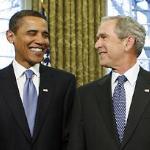Voters to Obama: Be More Like Bush

Much has been made over the latest CNN/Opinion Research poll, which suggests that in a hypothetical match-up, President Barack Obama would run just about even with his much maligned predecessor, George W. Bush. But equally surprising is that the public still prefers Obama to McCain.
The CNN/Opinion Research poll bolsters previous findings: a PPP poll showing voters in Ohio preferring Bush to Obama by eight points, and Bush's six point margin over Obama in a survey of 60 districts eyed by Democrats for possible pick-ups. CNN's polling also reaffirms other trends: President Obama's popularity is below 50 percent, and there’s a tremendous enthusiasm gap favoring Republicans.
But, unexpectedly, this Republican tide is not lifting the boats from the 2008 campaign When voters were asked if they would rather have John McCain instead of the current chief magistrate, the president handily cleaned McCain's clock, 50 to 42 percent. The margin for the number two position was marginally wider; a 10 point advantage for Vice-President Biden over former Governor Sarah Palin.
To sum up: Republicans on the march, the President's numbers low, and George W. Bush heh-hehing it up in Dallas. (All reasonable given our presently conservative political environment.) Yet, when it comes to re-running the 2008 election, Americans decisively feel they made the right choice. Why?
Possibly, part of this quandary is addressed by James Carville and Stan Greenberg's latest report on Democratic campaign messaging: "For some, going back to four years ago does not look so uninviting right now: 'I was doing a heckavah lot better under Bush.'" Still, the better employment conditions of the Bush years versus the first two Obama years does not explain the Bush-McCain disparity. (For one thing, Americans are still far more likely to say the Great Recession was Bush's fault than Obama's fault.) If this were a purely pocketbook matter, then the better economy under the last Republican president would lend itself to more support for the last Republican presidential nominee.
One possible conjecture is the electorate is more conservative due to Tea Party energy, and the Tea Partiers loathe McCain and generally like Bush. Yet, the Tea Party flat-out adores Sarah Palin, and her numbers versus Biden are somewhat worse than McCain's versus Obama. So let's take the Tea Party out of this.
Here's my hypothesis: voters soured on McCain and Palin because they cannot see them running the government and accomplishing an agenda.
In the case of McCain, we saw the beginning of this during the 2008 campaign. McCain lurched from stunt to stunt, most memorably suspending his campaign to "broker" a Wall Street rescue deal. That fiasco culminated in the senator being woefully unprepared (left "holding a single note card") for the White House summit McCain had called and leaving Secretary Paulson with the impression he never had a plan at all, just a "political gambit". In other words, McCain was great at garnering media attention, and bad at governing.
The Arizonan's embarrassing 2010 primary campaign made things worse. McCain showed himself unserious about policy positions he once adamantly held. In order to save his political soul, McCain was reduced to uncomfortably backing "the danged fence" and supporting Arizona's hawkish immigration bill. The pandering made a mockery of McCain's strident support for immigration reform and amnesty. Ultimately, Senator McCain flat-out denied that he was a "maverick", despite consistently using the term for political gain in 2008.
As for Palin, she certainly has not offered the electorate much on the governing front (indeed, she resigned her job where she did actual governing). Palin claims she has "common sense solutions", but rarely spells them out. Her most notable policy foray was her demonstrably false accusation that the president's healthcare reform bill would lead to "death panels" for Down syndrome children.
In contrast, before deciding on running, George W. Bush told George Shultz that he wanted "to make sure there are significant things that I want to accomplish as president." And, as president, he acted accordingly. Bush saw a failing education system, and responded with No Child Left Behind. Bush saw the aftermath of 9/11, and responded with Afghanistan, Iraq, the Patriot Act, the Freedom Agenda, and the Homeland Security Department. Bush saw seniors unable to afford prescription drugs, and responded with Medicare Part D. Bush saw millions of undocumented and illegal aliens, and responded with several go-arounds on comprehensive immigration reform. Bush saw a bankrupt Social Security system, and responded with partial privatization.
Whatever we want to say about the merits of these actions or proposals, Bush wanted to govern.
President Obama can be credited with a similar governing acumen (at least domestically), having bet much of his first term on his audacious stimulus package and healthcare reform initiatives. It may not be the right medicine, but it is substantive stuff. McCain and Palin are simply not viewed in the same light.
Right now, the American people want someone with a tangible agenda and the seriousness to govern on it. Food for thought for many possible Republican nominees in 2012.